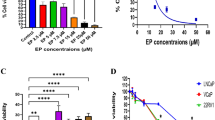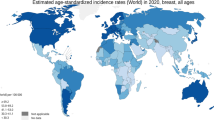Abstract
Objective
To examine the effect of the aqueous extract of Ligustrum robustum on tumor growth in vitro and in vivo and explore the possible molecular mechanisms.
Methods
In in vitro study, cell viabilities of human cervical carcinoma cells (HeLa), human breast cancer cells (MCF-7), human prostate cancer cells (PC-3), human hepatoma cells (7721) and human colon carcinoma cells (SW480) were evaluated with cell counting kit-8. For L. robustum-treated Hela cells, early or late apoptosis were evaluated by annexin V/PI staining. Mitochondrial membrane potential was measured by staining cells with JC-1. Apoptosis was monitored by nuclear morphology based on chromatin condensation and fragmentation by 4′,6-diamidino-2-phenylinole (DAPI) staining. Caspase-3 and -8 activity levels were measured by a colorimetric assay. In vivo, to evaluate the possible mechanism of L. robustum-mediated antitumor effect, nude mouse xenograft study was also conducted.
Results
In in vitro study, L. robustum was found to be toxic to HeLa, MCF-7, PC-3, 7721, SW480, with an half maximal inhibitory concentration value of 2–5 mg/mL (P<0.05). Moreover, externalization of phosphatidylserine, loss of mitochondrial membrane potential, DNA fragmentation and activation of caspase-3 and -8 were detected in L. robustum-treated Hela cells. Using a nude mouse model bearing Hela xenografts, we found that L. robustum reduced tumor volume and tumor weight (P<0.05), but had no effect on body weight and histological damage of important organs. Intraperitoneal injection of L. robustum caused a significant reduction in serum aspartate transaminase and alanine transaminase levels (P<0.05). Furthermore, cleaved caspase-3-positive and terminal nucleotidyl transferase-mediated nick end labeling (TUNEL)-positive cells were observed in L. robustum-treated tumor tissues.
Conclusions
L. robustum inhibits tumor cell growth both in vitro and in vivo by inducing apoptosis in a caspase-dependent way without apparent hepatic toxicity and histological damage, which may offer partial scientific support for the ethnopharmacological claims of L. robustum as a herbal tea for its antitumor activity.
Similar content being viewed by others
References
Chen D, Wan SB, Yang H, Yuan J, Chan TH, Dou QP. EGCG, green tea polyphenols and their synthetic analogs and prodrugs for human cancer prevention and treatment. Adv Clin Chem 2011;53:155–177.
Chen D, Milacic V, Chen MS, Wan SB, Lam WH, Huo C, et al. Tea polyphenols, their biological effects and potential molecular targets. Histol Histopathol 2008;23:487–496.
Liu L, Sun Y, Laura T, Liang X, Ye H, Zeng X. Determination of polyphenolic content and antioxidant activity of kudingcha made from Ilex kudingcha C.J. Tseng. Food Chem 2009;112:35–41.
Xiao WJ, Han XF, Tan ZL, Tang SX, Gong ZH, Bamikole MA, et al. Milk powder induced lipid peroxidation reduction using Ku Ding tea (Lactuca taiwaniana Maxim) in rats. J Food Sci Technol 2011;48:447–453.
Li L, Peng Y, Xu LJ, Wu-Lan TN, Shi RB, Xiao PG. Chemical constituents from Ligustrum robustum Bl. Biochem Syst Ecol 2010;38:398–401.
Yan D. Health functions, plant species and name evolution of Ku-Ding-Tea. Guizhou Agr Sci (Chin) 2007;35:114–116.
Lau KM, He ZD, Dong H, Fung KP, But PPH. Antioxidative, anti-inflammatory and hepato-protective effects of Ligustrum robustum. J Ethnopharmacol 2002;83:63–71.
Seelinger G, Merfort I, Wölfle U, Schempp CM. Anticarcinogenic effects of the flavonoid luteolin. Molecules 2008;13:2628–2651.
Gao BB, She GM, She DM. Chemical constituents and biological activities of plants from the genus Ligustrum. Chem Biodivers 2013;10:96–128.
Liu S, Yang H, Wan L, Cai HW, Li SF, Li YP, et al. Enhancement of cytotoxicity of antimicrobial peptide magainin II in tumor cells by bombesin-targeted delivery. Acta Pharmacol Sin 2011;32:79–88.
Lin J, Chen Y, Wei L, Chen X, Xu W, Hong Z. Hedyotis Diffusa Willd extract induces apoptosis via activation of the mitochondrion-dependent pathway in human colon carcinoma cells. Int J Oncol 2010;37:1331–1338.
Lin JM, Wei LH, Chen YQ, Liu XX, Hong ZF, Sferra TJ, et al. Pien Tze Huang induced apoptosis in human colon cancer HT-29 cells is associated with regulation of the Bcl-2 family and activation of caspase-3. Chin J Integr Med 2011;17:685–690.
Cai Q, Lin J, Wei L, Zhang L, Wang L, Zhan Y, et al. Hedyotis diffusa Willd inhibits colorectal cancer growth in vivo via inhibition of STAT3 signaling pathway. Int J Mol Sci 2012;13:6117–6128.
Gao H, Lamusta J, Zhang WF, Salmonsen R, Liu Y, O’Connell E, et al. Tumor cell selective cytotoxicity and apoptosis induction by an herbal preparation from Brucea javanica. N Am J Med Sci (Boston) 2011;4:62–66.
Acknowledgement
This study was supported by Public Health and Preventive Medicine Provincial Experiment Teaching Center at Sichuan University, and Food Safety Monitoring and Risk Assessment Key Laboratory of Sichuan Province.
Author information
Authors and Affiliations
Corresponding author
Additional information
Supported by National Natural Science Foundation of China (No. 81603018 and No. 81273055), and Sichuan Provincial Department of Science and Technology (No. 2014JY0001)
Rights and permissions
About this article
Cite this article
Zuo, Hj., Liu, S., Yan, C. et al. In Vitro and In Vivo Evaluation of Antitumor Activity of Ligustrum robustum, A Chinese Herbal Tea. Chin. J. Integr. Med. 25, 425–430 (2019). https://doi.org/10.1007/s11655-018-2983-5
Accepted:
Published:
Issue Date:
DOI: https://doi.org/10.1007/s11655-018-2983-5




